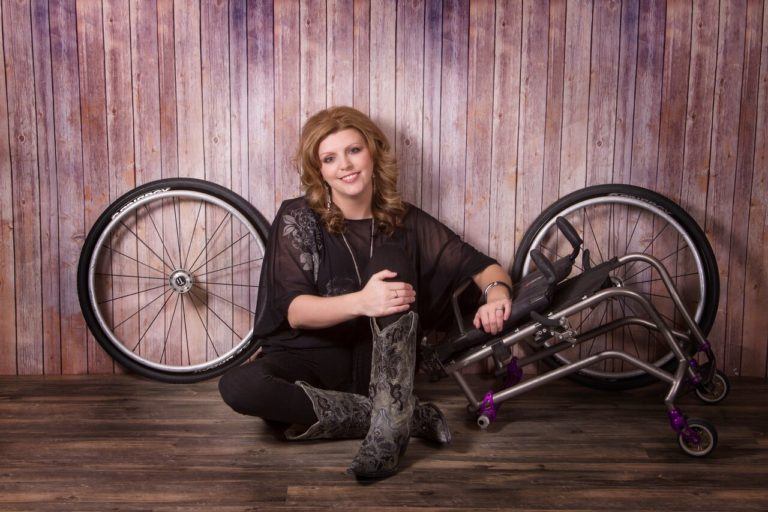 Ashlee Lundvall of Cody, Wyoming, was a featured speaker at the Professional Outdoor Media Association’s (POMA) Conference in June, 2017. Until the age of 16, Ashlee played basketball, volleyball, fast pitch and slow pitch softball. But when she fell off a hay rack in 1999, she landed on a pitchfork and suffered a spinal cord injury. In this interview, Ashlee shares about the lessons she’s learned since and her redefined life.
Ashlee Lundvall of Cody, Wyoming, was a featured speaker at the Professional Outdoor Media Association’s (POMA) Conference in June, 2017. Until the age of 16, Ashlee played basketball, volleyball, fast pitch and slow pitch softball. But when she fell off a hay rack in 1999, she landed on a pitchfork and suffered a spinal cord injury. In this interview, Ashlee shares about the lessons she’s learned since and her redefined life.
“For about 2 years after my accident, I had to learn how to get healthy again. I had to learn how to be independent, how to get myself ready in the morning, how to drive and how to shop for groceries.”
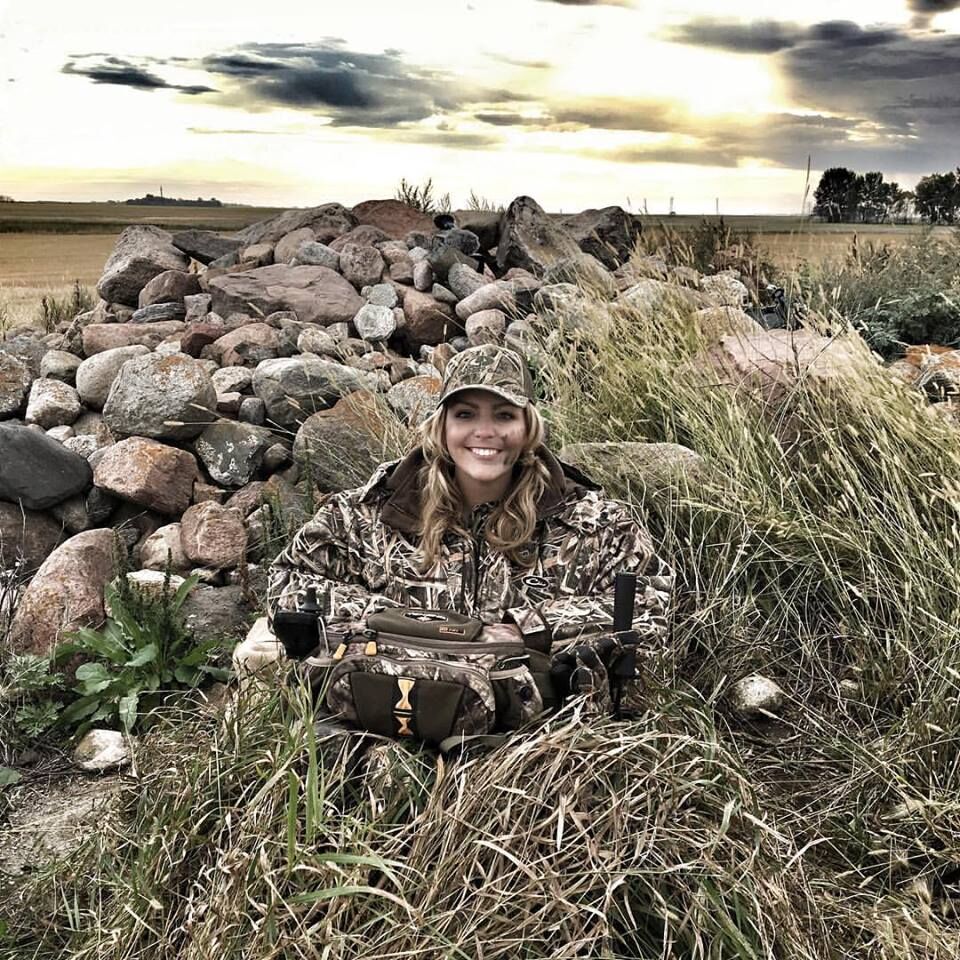
But after those 2 years, Ashlee Lundvall’s confidence rebuilt as she began to reconnect with what she now calls “the fun stuff” – hiking, hunting, fishing, camping, riding ATVs, paddling a kayak and becoming a strong advocate for people with disabilities.
At the POMA Conference, the topic of Ashlee’s speech was “Language Matters – Disability in the Media.”
“I wanted to provide information and education for media people,” Ashlee says, “I wanted to teach them why they should look for stories about people with disabilities, how to approach someone with a disability, and how to act around a person with a disability.”
Ashlee’s first order of business was disability etiquette. “When you approach someone in a wheelchair, don’t lean on his or her wheelchair, and don’t touch the wheelchair, because the wheelchair is a part of that person.”
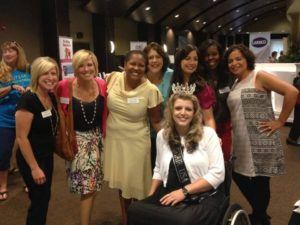
She explained that journalists should do what they can to get on eye level with a person in a wheelchair and make eye contact (by pulling up a chair or squatting down). Otherwise the person in the wheelchair would have to continuously look up, making their neck sore.
For Media Professionals: Ashlee Lundvall’s Tips for Interviewing People with Disabilities
1. Identify Yourself
If you’re interviewing someone with a visual problem, give him some characteristics to let him know what you look like. If a service dog is involved, understand that the dog is working and isn’t a pet. Don’t touch the dog, or ask to pet it.
2. Use People First Language
“Instead of saying ‘wheelchair bound,’ use the term, ‘a person in a wheelchair,’” Ashlee emphasizes. “For instance, I’m Ashlee. I’m a woman who uses a wheelchair. I’m not a disabled woman. Use positive language.
Don’t use the term, ‘She’s confined to a wheelchair,’ or ‘She’s crippled by her disability.’
My wheelchair gives me freedom, and I’m glad I have it.” Never use words like handicapped and retarded, which are very negative and insulting to people with disabilities.
United Spinal Association offers a free Disability Etiquette booklet that gives more pointers on People First language. Download it here.
Video: Ashlee Explains Why She Pursues the Outdoors in a Wheelchair
3. Give Information About Yourself Before Asking Sensitive Questions
To learn more about a person’s disability, don’t lead with the question, “How did you get hurt?” Instead, Ashlee suggests you open the conversation with information about yourself. Then, when the time’s right, use the words, “Do you mind if I ask you about your disability?” or “Do you mind telling me more about your disability?” Then the person can answer, “Yes,” and give you the information about his disability. If the person says, “No,” then you know they’re not comfortable talking about their disability.
4. Realize People with Disabilities Don’t Need Pity
“If someone looks like he needs assistance or help, you should ask first if you can help them,” Ashlee suggests. “If the person with the disability says, ‘I’m fine. I can handle it,’ you need to believe them and let them handle the situation on their own. Respect that person’s independence and believe they can handle the problem. Independence is very important to people with disabilities.
“For instance, if I drop something on the floor, being able to pick up what I’ve dropped is very important to me. The next time I drop something on the floor, someone may not be around to pick it up for me. I need to be able to perform that task by myself, even if I take longer to do it.”
Ashlee emphasizes that, “Compassion is when you feel bad for someone, and you help them take a step forward. Pity is when you feel bad for someone, and you force them to take a step backward.
Feeling bad for someone in a wheelchair is okay, but don’t put him or her in a situation where you’re pitying them and making them feel bad about themselves.”
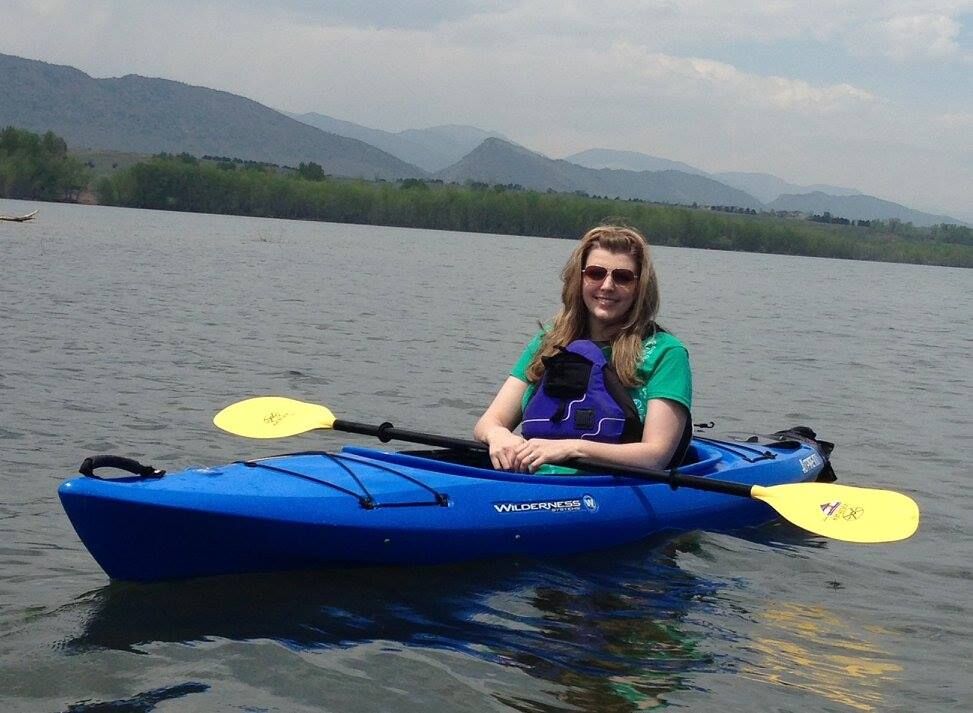
5. Be Ready for a Dark Sense of Humor
“Some of us in wheelchairs have a dark, twisted sense of humor,” Ashlee shares. “Often people with disabilities will joke about their disabilities as a way to break the ice and make people feel comfortable around them.
For instance, if I’m with a group of people in cold weather, I may say, ‘The weather’s so cold, I can’t feel my legs,’ to break the ice.
I want to let people know that I’m comfortable with my disability, and they should be too. I love my life. Being injured hasn’t been the end of my world, and I have a good sense of humor about my disability. I can laugh about it, and people can laugh with me.”
For People with Disabilities: Ashlee Lundvall’s 5 Ways to Approach Adversity
1. Realize everyone will have a pitchfork moment.
“All of us will have [at least] one defining moment that changes our lives or sets us on a different course than what we’ve considered for our lives. We can let tragedy define us, or we can redefine the pathway we plan to take into this new life and have a good attitude about the new direction we’re taking.”
2. Don’t settle.
“When we experience a tragedy or an accident, we may settle for what’s less than the best for us – perhaps in a relationship or an occupation. If I’m talking to teenagers, I may be explaining this topic through relationships or friendships. For me, I initially thought, ‘I’m a girl in a wheelchair. No one will want to be my friend or date me.’ I had to learn that I was worthy of the right man, the correct job and the best life had to offer me. I didn’t have to settle for what I could get, or what I could do that was less than the best.”
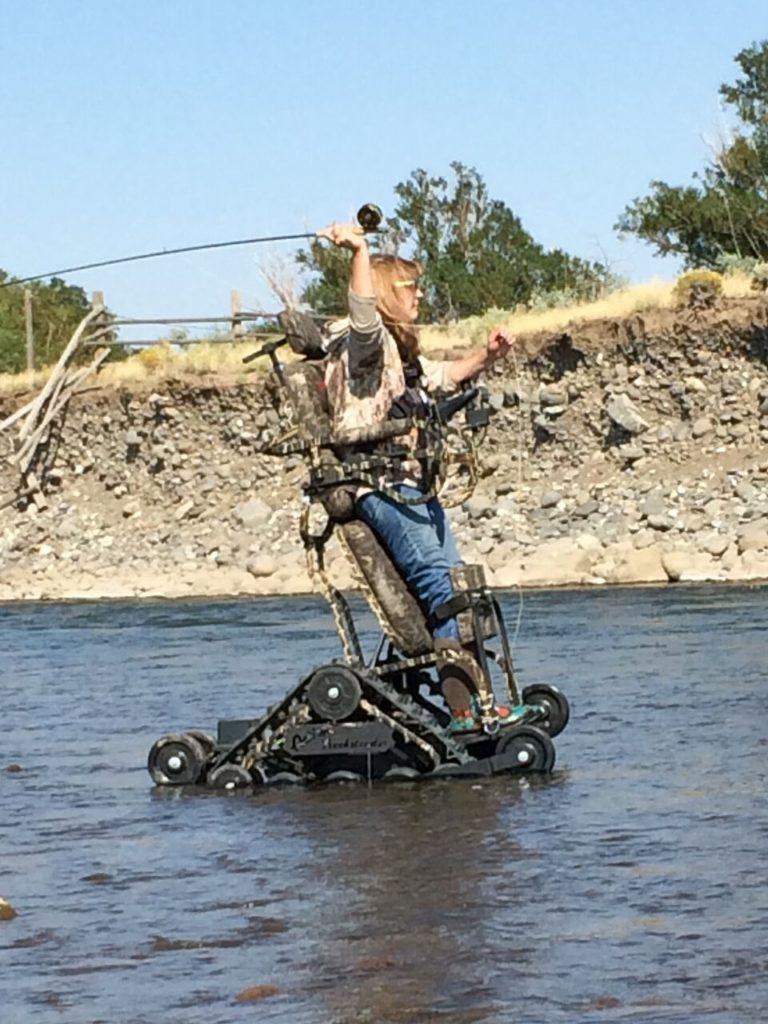
3. Stay active.
“A disability can affect your health severely. [Some] people will develop high blood pressure, diabetes or obesity, because people with disabilities often don’t stay active. Depending on a person’s disability, the term, ‘staying active,’ can mean different things. However, a person with a disability needs to challenge himself physically as much as possible.”
4. Be brave.
“The best things in life happen outside your comfort zone. So, I challenge people to take risks, try new things and to chase their dreams – no matter how impossible those dreams seem to be.”
5. Laugh often.
“Of all the things that you can’t choose in life, the one thing you can choose is your attitude. I make a choice every day to be joyful, have a sense of humor and smile as much as I can. I want to let people know that I love my life, and I wouldn’t change it. My sense of humor enables me to cope with the things I deal with daily and better break the ice with other people and make them feel more comfortable around me.”
Closing Thoughts: Love What You Do
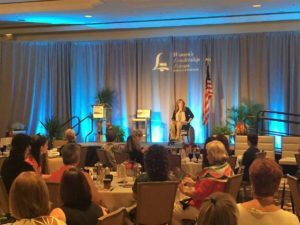 “I’m excited about my work, and I enjoy it,” Ashlee says. “I’m an inspirational speaker, a writer and a disability advocate.” Ashlee stays extremely busy. She explains that obviously many people can’t work, due to their disabilities, and she’s thankful programs are available to take care of their needs. But Ashlee also explains, “I believe if you’re able and independent enough to work and contribute to society, you should be doing that.”
“I’m excited about my work, and I enjoy it,” Ashlee says. “I’m an inspirational speaker, a writer and a disability advocate.” Ashlee stays extremely busy. She explains that obviously many people can’t work, due to their disabilities, and she’s thankful programs are available to take care of their needs. But Ashlee also explains, “I believe if you’re able and independent enough to work and contribute to society, you should be doing that.”
Ashlee Lundvall’s work keeps her motivated, gives her a reason to get up and gives her something to look forward to every day.
Each presentation Ashlee gives is tailor-made to fit the group and help them reach their goals. One of her talks is about discovering your disability. “This talk is about anything in your life that keeps you from achieving your goals in life,” Ashlee explains.
“Everyone will have a defining moment in his or her life that changes his life drastically. If you haven’t had that moment yet, that moment is in your future, and that moment actually can disable your life. Regardless of what your defining moment is, I try to explain that you can and should continue to move forward with your life.”
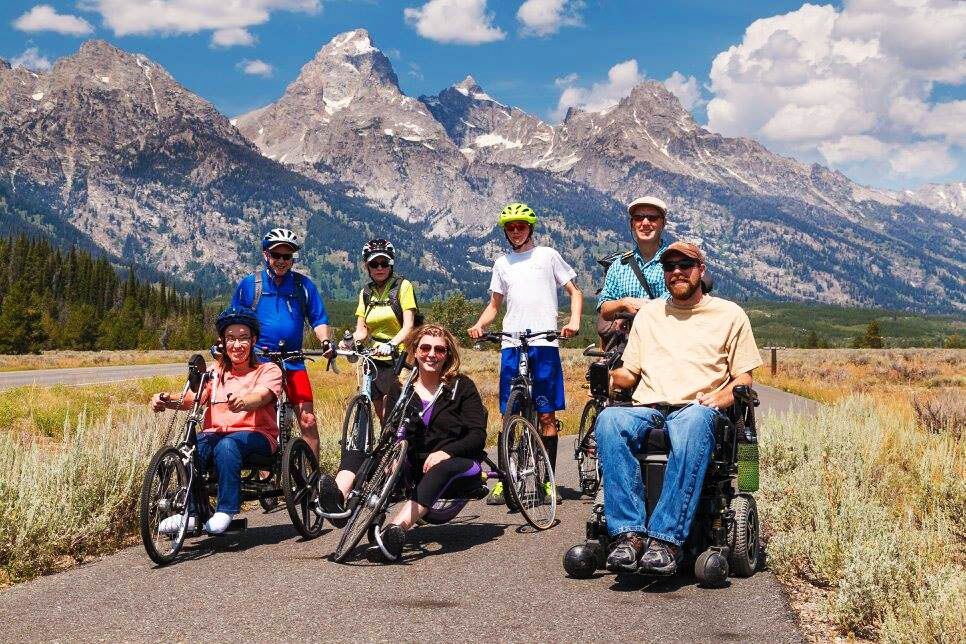 “At the POMA Conference, we talked about what writers should call people with disabilities, but we in the disability community have a word for the people who don’t have a disability – T.A.B.S., which stands for temporarily able-bodied.
“At the POMA Conference, we talked about what writers should call people with disabilities, but we in the disability community have a word for the people who don’t have a disability – T.A.B.S., which stands for temporarily able-bodied.
Everyone is headed toward a life of disability as we get older, perhaps due to accidents, illnesses, not hearing or seeing well and/or not walking well. The more you can learn about disabilities now, the better you’ll be prepared for disabilities as you age.”
To learn more about Ashlee Lundvall, visit her webpage where you can read her blog and learn about her book A Redefined Life: Lessons From A Pitchfork.
Enjoy Our Free Resources & Articles
 CURE NATION is designed with you in mind, to offer assistance and education when you need it through a personal support program.
CURE NATION is designed with you in mind, to offer assistance and education when you need it through a personal support program.
All of the information you find below and on our related social media pages is meant to guide you to places, topics and, resources that enhance your life, while also connecting you with a growing group of friends.
- Sign up for our free, CURE NATION e-newsletter to have our latest stories delivered directly to you, once a month.
- Get our FREE LIFESTYLE + TRAVEL BOOKS here.
- Have an idea you’d like to share? Let us know.
- Be sure to take a minute to meet our Cure Advocates too.

